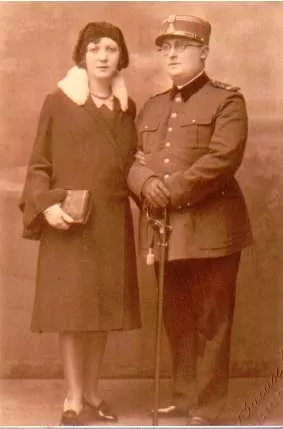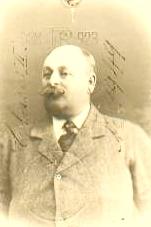Rebeca and Noe Gatlan
This photo was taken in the 1940s, in Bucharest. The one on the right is my father, Noe Gatlan, who was at this time officer in the Romanian army. The other person is my mother, Rebeca Gatlan, who was a housewife.
My father was born in 1904. I look more like my father. He studied in Italy. His family sent him to medical school there - he studied surgery in Turin between 1924 and 1929. So he was a medical school graduate. He didn't become a surgeon; he was specialized in skin and venereal diseases. Even the post on the practice our family used to have said that. I don't know if my father did his military service, but I know he worked as an army physician in Braila. I don't know for how long he did that, because I don't have any papers. Had I had such papers, I might have got some aids, because I know they sent some from Germany. So he worked as a physician in the Romanian army for a while.
Here's the story of how my parents met. They didn't meet in Iasi, but in Barlad. My mother had breast eczema. My father was studying medicine - after the 2nd or 3rd year, they were already calling him 'Doctor' - and had the right specialization. Their parents already knew one another, because Barlad was even smaller than it is today, so his parents said, 'Look, our boy, Nae - this is how they called him - is going to come to your place and examine the girl.' In the end, my grandmother took my mother to my father's for the examination, and this is how my parents met. My father treated her and cured her.
Of course, during the repeated house calls and the treatment, the two youngsters came to like each other; and, because their parents already knew one another, they decided to get married. It was a love marriage and they loved each other very much. She married young, when my father was in the senior year at the medical school. She was almost 18 when they got married, on 6th January 1929, on Epiphany.
My father's clientele was multi-ethnic. During World War II, he was very busy, especially after the Russians occupied us. As he was a gynecologist - he mostly practiced gynecology and had a gynecological table - Russians used to come to him to treat their gonorrhea. So many of my father's clients were Russian officers - they asked one another where they had their condition treated, and this is how my father's name came up.
There was also that dreadful period when Jews were sent to sweep the streets. But my father kept his practice for a while. He wasn't deported to Transnistria, like others were, but he did get sent to forced labor here, locally, in 1942 or 1943. They took white-collar and blue-collar Jews out in the street and made them do chores. Jews had a really hard time in Bukovina and Transylvania. Those in the Regat [Kingdom] weren't forced to do hard labors. They were sent to sweep the streets. But they knew that Jews from other regions were being sent to Auschwitz or to Transnistria, so, of course, they were afraid not to end up there themselves.
































